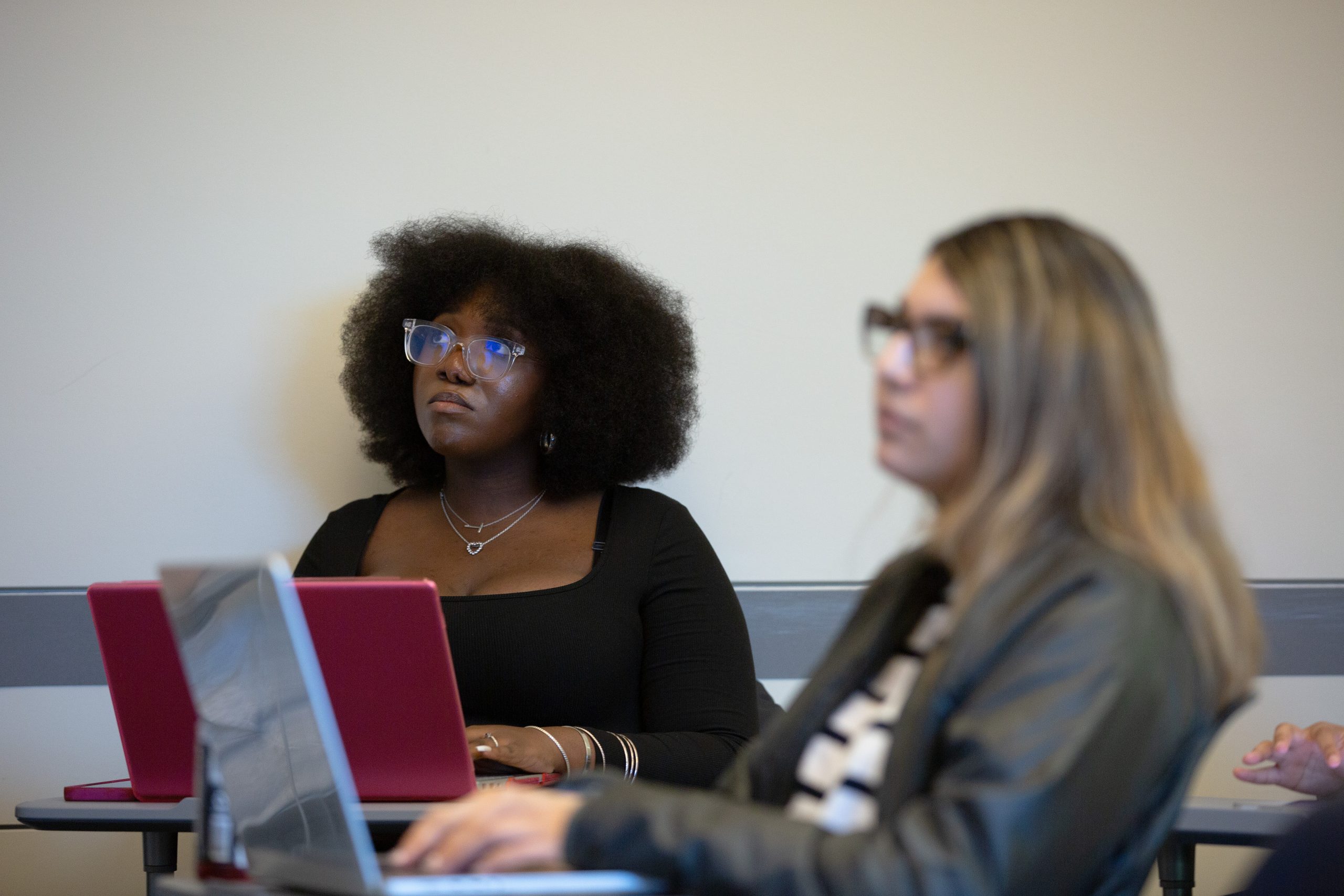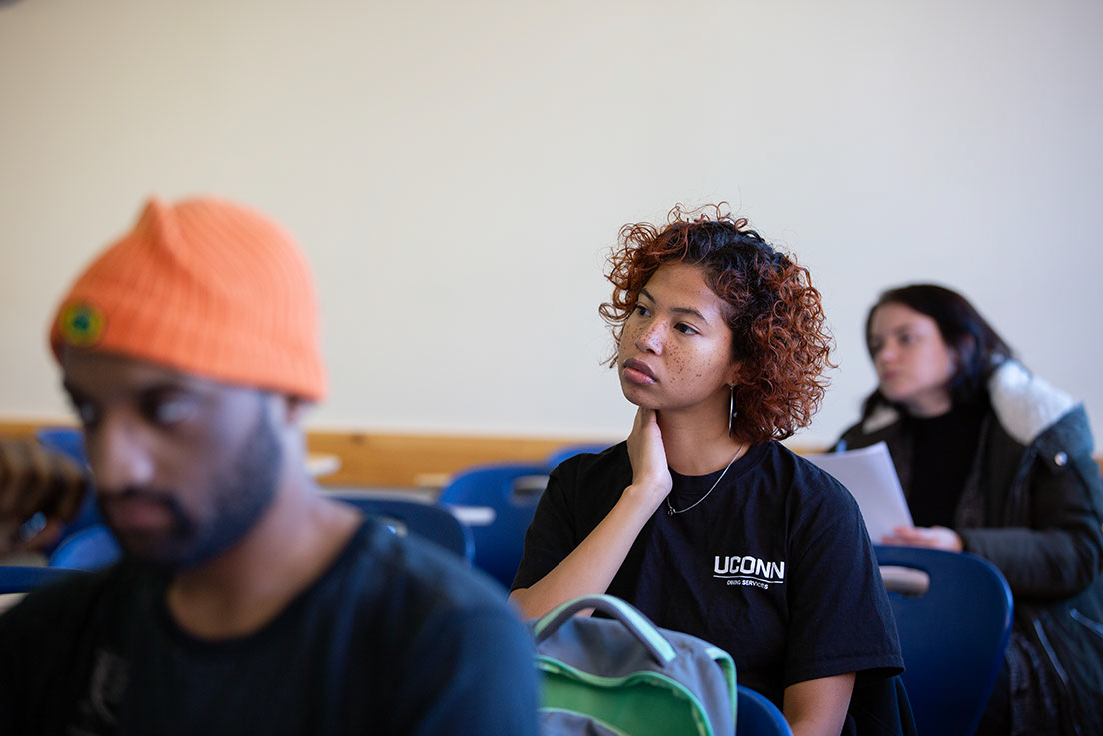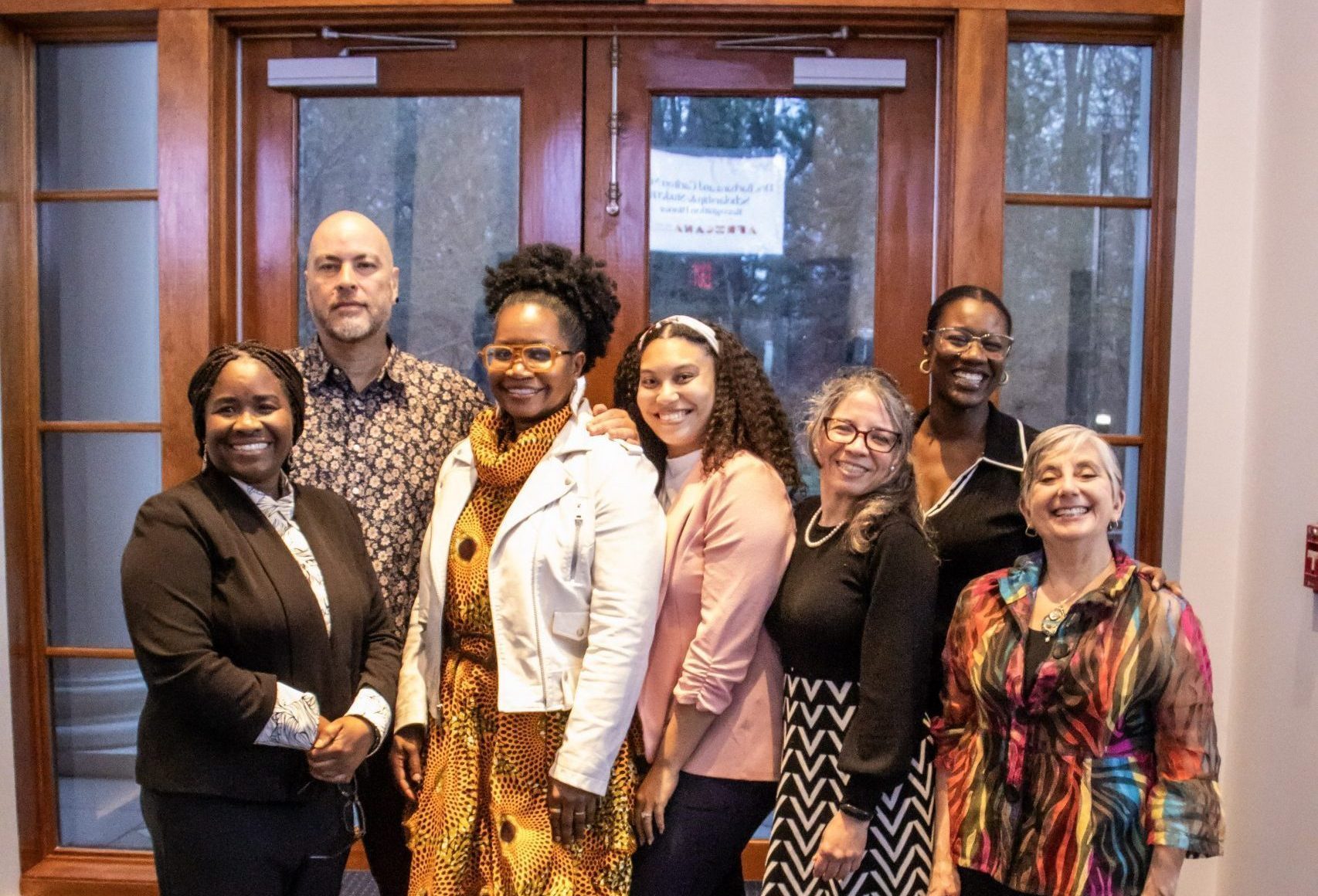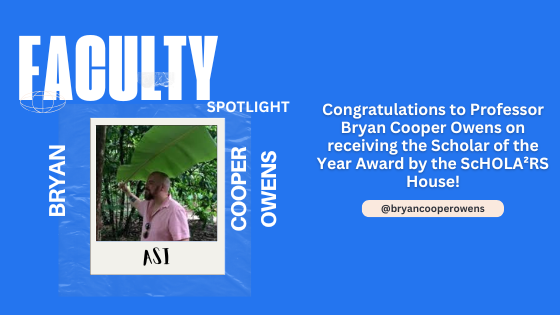Welcome to the Africana Studies Institute
UConn’s Africana Studies Institute is a vibrant community of scholars who study the African American experience, Africa, and the African Diaspora.
Moratorium, October 15, 1969. Students at the Vietnam War protest in front of the Student Union. (Howard Goldbaum Collection of Connecticut Daily Campus Negatives, Archives & Special Collections, University of Connecticut Library.)
What is Africana Studies?
Africana Studies is a field of study that is interdisciplinary in focus. The Institute offers a wide range of courses, which are cross-listed with anthropology, sociology, history, political science, human development and family studies, psychology, art and art history, English, among other fields. More specifically at UCONN, for decades we have trained our students to critically analyze the varied experiences of people of African descent globally and locally. We have a strong public history presence that focuses on Black people in New England and Connecticut that helps the program remain committed to the principles that Africana Studies was founded on, community engagement.
Why major or minor in Africana Studies?
It has become increasingly important to successive generations of students entering the workforce to develop and refine skills needed to practice cultural competence and critically analyze the varied experiences of African descended people in this country and around the world. The Africana Studies Institute offers a Bachelor of Arts (BA) degree and a minor in Africana Studies, which provides a solid foundation for jobs in health care, law, education, journalism, government, and charitable, nonprofit organizations.
What we offer
- You will learn from some of UConn’s best teachers and mentors as well as trailblazers in their respective fields.
- You will enhance your critical thinking, writing, analysis, and communication skills.
- Opportunities to study abroad in Ghana and Kenya for course credit.
- Faculty pairing: 1:1 academic advising, career mentoring, and research opportunities.
Upcoming Events
If not explictly stated otherwise, start_date/today and end_date/6 months are implied in the URL.
-
Mar3
-
Mar28
Undergraduate Advising

Major in Africana Studies

Minor Options
The Institute offers two minors in Africana Studies and African Studies, coupled with study abroad opportunities in African countries.

Coursework
Explore the wide range of courses offered through our Africana Studies programs.

Find a Professor
Explore our roster of faculty members and their areas of research expertise.

The UConn Africana Studies Institute presents a special screening of The Ebony Canal, followed by a discussion with 4x Emmy Award–winning director Emmai Alaquia. Narrated by Viola Davis, this documentary explores the disparities in infant and maternal mortality while uplifting stories of resilience, hope, and change in maternal health.
🗓 Tuesday, March 3, 2026
⏰ 2–5 PM
📍 UConn Student Union Theater
Feel free to come watch, reflect, and be part of the dialogue!

The UConn Africana Studies Institute presents a special screening of The Ebony Canal, followed by a discussion with 4x Emmy Award–winning director Emmai Alaquia. Narrated by Viola Davis, this documentary explores the disparities in infant and maternal mortality while uplifting stories of resilience, hope, and change in maternal health.
🗓 Tuesday, March 3, 2026
⏰ 2–5 PM
📍 UConn Student Union Theater
Feel free to come watch, reflect, and be part of the dialogue!
...

Welcome back to school students! We hope you have a wonderful and restful spring semester. Africana studies is always open for visitors to study, talk, and relax ✨⭐️

Welcome back to school students! We hope you have a wonderful and restful spring semester. Africana studies is always open for visitors to study, talk, and relax ✨⭐️ ...

COGS 2345/AFRA 2345: Language & Racism 📚🗣️
Explore how language shapes race, identity, and power. From everyday speech to media, learn how words reinforce or resist racism using tools from cognitive science and sociolinguistics.
T/Th 11:00AM–12:15PM
Instructor: Portia Washington
#UConn #AFRA #COGS #LanguageAndRace #Sociolinguistics

COGS 2345/AFRA 2345: Language & Racism 📚🗣️
Explore how language shapes race, identity, and power. From everyday speech to media, learn how words reinforce or resist racism using tools from cognitive science and sociolinguistics.
T/Th 11:00AM–12:15PM
Instructor: Portia Washington
#UConn #AFRA #COGS #LanguageAndRace #Sociolinguistics
...

📚Understand how white supremacy, privilege, and colonialism shape global racial hierarchies in AFRA 3898/SOCI 2998 with Dr. Embrick in Spring 2026!

📚Understand how white supremacy, privilege, and colonialism shape global racial hierarchies in AFRA 3898/SOCI 2998 with Dr. Embrick in Spring 2026! ...

Gain critical insight into culture, structure, and community in this class. Explore how research, media, and policy shape Black family life in Black Families (AFRA 3898/ HDFS 3095)🖤
This class is open to All

Gain critical insight into culture, structure, and community in this class. Explore how research, media, and policy shape Black family life in Black Families (AFRA 3898/ HDFS 3095)🖤
This class is open to All
...

Presenting the Luckey Family Studies Lecture Series!
Join us for “Pretty Enough? Exploring the impact of media’s sexualized and euro-centric beauty ideals ofr girls and young women” with Dr.L. Monique Ward, Professor of Psychology at the University of Michigan.
Wednesday October 8th in Rowe 320 or join virtually from the link in the bio!

Presenting the Luckey Family Studies Lecture Series!
Join us for “Pretty Enough? Exploring the impact of media’s sexualized and euro-centric beauty ideals ofr girls and young women” with Dr.L. Monique Ward, Professor of Psychology at the University of Michigan.
Wednesday October 8th in Rowe 320 or join virtually from the link in the bio!
...

✨ Interested in graduate studies in African American & Diaspora literature, language, culture, and Black digital/public scholarship? ✨
Apply to the Cooper-Du Bois Mentoring Program — a three-day virtual experience (Oct. 24–26) that connects you with faculty, graduate students, and fellows while preparing you for the grad school journey.
📌 Applications due: Friday, Sept. 30 @ 11:59 PM EST and the link is in the bio!
Don’t miss the chance to join this powerful network and get the tools you need to thrive!

✨ Interested in graduate studies in African American & Diaspora literature, language, culture, and Black digital/public scholarship? ✨
Apply to the Cooper-Du Bois Mentoring Program — a three-day virtual experience (Oct. 24–26) that connects you with faculty, graduate students, and fellows while preparing you for the grad school journey.
📌 Applications due: Friday, Sept. 30 @ 11:59 PM EST and the link is in the bio!
Don’t miss the chance to join this powerful network and get the tools you need to thrive!
...

Cool off with us at the Africana Studies Institute Ice Cream Social! This event will be held at the UConn Dairy Bar and the RSVP link will close today at 5pm. 🍦🍨

Cool off with us at the Africana Studies Institute Ice Cream Social! This event will be held at the UConn Dairy Bar and the RSVP link will close today at 5pm. 🍦🍨 ...

ASI`s Associate Director, Dr. Fiona Vernal, is making a huge community impact by collecting Connecticut oral histories using the online platform, TheirStory. Check out the link in the bio to read more about Dr. Vernal and her oral history projects.

ASI`s Associate Director, Dr. Fiona Vernal, is making a huge community impact by collecting Connecticut oral histories using the online platform, TheirStory. Check out the link in the bio to read more about Dr. Vernal and her oral history projects. ...

We’re so proud to celebrate Trinity Stewart, one of our outstanding Africana Studies students, for being selected as a 2025 Mellon Scholar with the Library Company of Philadelphia! Trinity’s dedication to scholarship, research, and uplifting Black histories continues to inspire our community. Congratulations on this incredible opportunity!🎊🎉

We’re so proud to celebrate Trinity Stewart, one of our outstanding Africana Studies students, for being selected as a 2025 Mellon Scholar with the Library Company of Philadelphia! Trinity’s dedication to scholarship, research, and uplifting Black histories continues to inspire our community. Congratulations on this incredible opportunity!🎊🎉 ...

Faculty Spotlights 📚✨
We are proud to highlight the brilliance and impact of Professors Deirdre Cooper Owens, David Embrick, and Fumilayo Showers: three visionary scholars advancing critical conversations on race, gender, and health equity.

Faculty Spotlights 📚✨
We are proud to highlight the brilliance and impact of Professors Deirdre Cooper Owens, David Embrick, and Fumilayo Showers: three visionary scholars advancing critical conversations on race, gender, and health equity.
...

Alumni Spotlight✨
Help us Celebrate our incredible alumni who exemplify leadership dedication and their lasting impact long after leaving campus. Take a look at Alicia, Tony, and Wafiyyah who continue to inspire through their acheivements!
#AlumniSpotlight #UConnASI

Alumni Spotlight✨
Help us Celebrate our incredible alumni who exemplify leadership dedication and their lasting impact long after leaving campus. Take a look at Alicia, Tony, and Wafiyyah who continue to inspire through their acheivements!
#AlumniSpotlight #UConnASI
...




